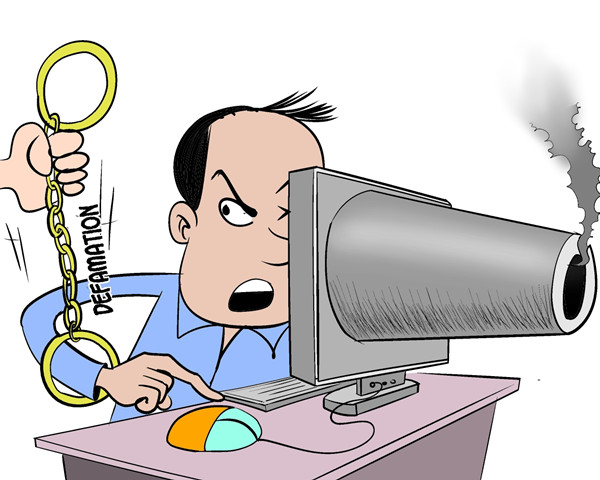Internet regulations can protect human rights
 0 Comment(s)
0 Comment(s) Print
Print E-mail Xinhua, September 13, 2013
E-mail Xinhua, September 13, 2013
Human rights experts from China and abroad on Thursday called for a sound environment for sustainable human rights development, saying the Internet is a double-edged sword in the process.
|
|
|
Justice has long arms [By Jiao Haiyang/China.org.cn] |
"The Internet is extremely important, as people from across the world can be in touch with each other and learn from each other, but the Internet can also be a danger for human rights," said Tom Zwart, director of the Netherlands School of Human Rights Research.
Zwart made the remarks at the sixth Beijing Forum on Human Rights, which opened Thursday and gathered more than 100 officials, foreign diplomats and human rights experts from the United Nations and 33 countries and regions.
"Unjustified rumors spreading over the Internet are continuing to play a role that may damage people's reputations," he added, saying that the Internet should have some regulations, and in fact many countries do have regulations for online activities.
Daniel Joyce, a lecturer at the Faculty of Law of the University of New South Wales, said that creating a sound online environment is a prerequisite and a part of the broader framework for human rights protection.
Experts said that better regulation of the Internet is conducive to human rights protection.
"I think the Internet should have regulations in the same way that speech has regulations," said Kate Westgarth, former director of Chinese Affairs of the UK Foreign and Commonwealth Office, adding that one cannot have complete freedom of speech.
"People spreading defamatory rumors on the Internet should bear the consequences, and people who encourage riots have to be controlled," she said, adding that this kind of control is also the protection of individuals.
Westgarth's thoughts were echoed by He Zhipeng, professor at the School of Law at Jilin University in northeast China's Jilin Province.
"It's very necessary to regulate the Internet, as unlimited free expression, such as spreading rumors to incite terrorism and war, could lead to great social chaos," she said.
With the rapid development of science and technology, experts also called on lawmakers across the world to revise regulations quickly to deal with Internet-related issues and their impact on society.
The experts' ideas came as Chinese public security authorities have launched campaigns to crack down on organized online rumor-spreading, which has led to many arrests.
People who post defamatory comments online in China will face up to three years in prison if their statements are widely reposted, according to a document released Monday by the Supreme People's Court and the Supreme People's Procuratorate.
The statement also stipulated that people will face defamation charges if online rumors they post are viewed by more than 5,000 Internet users or retweeted more than 500 times.
"Regulation on the Internet and Internet freedom are not contradictory when regulation is for better freedom," said Luo Yanhua, professor at the School of International Studies at Peking University, adding that China's current crackdown campaign on rumors is dedicated to protecting the freedom of the majority.
Experts also believe that authorities should strike a balance between cracking down on online rumors and protecting freedom of speech on the Internet.
"A balance has to be found, China is now discussing where to lay this balance, but finding a right balance is a real universal challenge," Zwart said.







Go to Forum >>0 Comment(s)